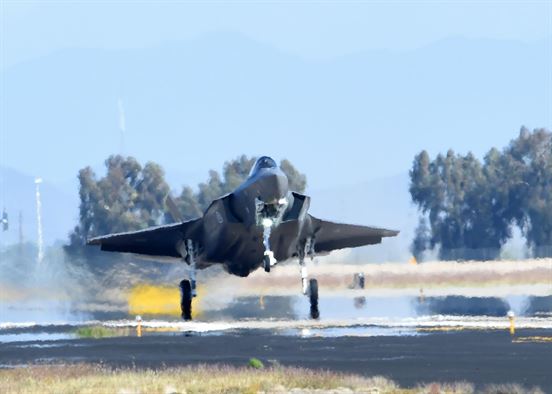Flight Ops Of 15 F-35As Suspended Due To Fuel Tank Problem
Posted on

Norway’s F-35A
The US Air Force and Norway announced the temporary suspension of flight operations for 15 F-35As today because of “peeling and crumbling insulation in avionics cooling lines inside the fuel tanks.”
The problem, caused by a supplier, was discovered during depot modification of an F-35A and affects a total of 57 aircraft, 42 of them still on the production line.
The Air Force statement by Ann Stefanek says 10 planes at Hill AFB, Utah, four at Luke AFB, Ariz. (including the two Norwegian planes), and one at Nellis AFB, Nev. are affected. Of the aircraft still in production, 28 belong to the U.S. and partner nations (three are Norwegian) and 14 are Foreign Military Sales aircraft.

F-35 production line
The problem “was discovered during depot maintenance on one of the impacted jets where loose insulation was discovered. The issue is confined to one supplier source and one batch of parts,” Mike Rein, Lockheed Martin spokesman, says in a statement.
The Joint Program Office provides some more detail, identifying the all-important “root cause.” It was the “use of nonconforming material for the tubing insulation and improper manufacturing processes during fabrication of the cooling lines.” The material, sad to say, “is not compatible with fuel, causing degradation of the insulation and resulting in it falling off the tubing.” I wouldn’t want to be that supplier.
The fleet aircraft will probably have go to the depot to fix the problem. The others will be fixed before delivery.
Engineers with the F-35 Joint Program Office and Lockheed Martin and Hill Air Force Base maintenance airmen have inspected eight aircraft and “are currently developing procedures to resolve or mitigate the issue prior to release of affected production aircraft to the field and the return of affected operational aircraft to flight operations,” Stefanek says.
Both Norway and the Air Force expressed confidence in the ability of Lockheed and the Joint Program Office to fix the problem.
Norway raised the intriguing point that the Joint Strike Fighter program’s international nature provides flexibility and redundancy to the allied fleet.
“For now, our pilots at Luke Air Force Base can continue their training using other aircraft at the base, including the other two Norwegian jets. That in itself is proof of how international partnerships provide better solutions than if we had faced this issue on our own,” Maj. Gen. Morten Klever, director of the Norwegian F-35 Program Office, says in a statement.
The US Air Force is also working “to mitigate the impact on operations, training, and readiness. Programmed flying training and other impacts will depend on the number and timing of aircraft returned to service,” Stefanek says in her statement.
Subscribe to our newsletter
Promotions, new products and sales. Directly to your inbox.
